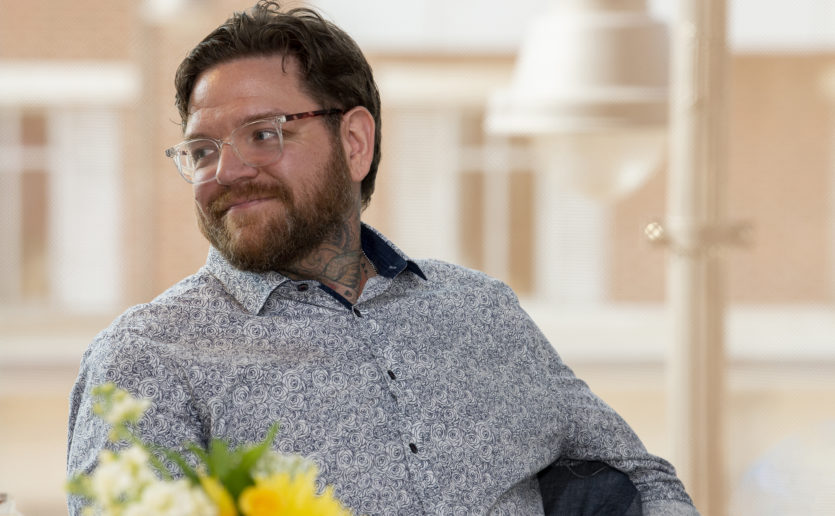On Dec. 20, 2018, Greenfield, Massachusetts resident and tattoo artist Ben Reigle woke up at 3:50 a.m. and was unable to move the right side of his body. He was rushed to Baystate Medical Center where stroke care specialists diagnosed him with a basilar stroke – a stroke that occurs in the brain stem. A thrombectomy, a procedure to remove a blood clot, was successfully performed and Mr. Reigle was discharged Dec. 29.

At 5 p.m. the same day, Mr. Reigle again could not move his right side, so he was flown to Massachusetts General Hospital.
A team of specialists determined that Mr. Reigle, 42, had experienced a second basilar stroke. He was not eligible to receive tissue plasminogen activator (tPA), the clot-busting drug used to treat some strokes, because the two events occurred in such a close time frame.
Difficult ICU Conversation
“To make it through a basilar stroke and then have another basilar stroke with the MRI that we saw, it was a difficult conversation we had the first night in the Neuro ICU,” said Chris Anderson, MD, director of Acute Stroke Services.
Several specialists from Mr. Reigle’s nearly 60-member care team presented his case at the 7th annual Stroke Breakfast Gala, May 31, 2019, at Mass General. The event recognizes and honors the hospital’s Comprehensive Stroke Center and features a unique patient case. The gathering also includes the Door-to-Needle Award. The 2018 award went to two teams who treated two tPA-eligible patients 22 minutes after hospital arrival.
“It’s a miracle that the doctors here gave me the gift of life.”
To treat Mr. Reigle’s second basilar stroke, surgeons used a suction device and a stent to retrieve the clot in his basilar artery. Because of the severity of the clot, Mr. Reigle’s surgical team conducted this procedure twice to restore blood flow to his brain.
Amazing Stroke Care Team
“You are all a truly amazing team, and this is an amazing hospital,” said Mr. Reigle. “You saved my life and I am eternally grateful. I hope to make you all proud. It’s a miracle that the doctors here gave me the gift of life. I’m going to pay that gift back by living a gracious life filled with joy.”
An artist at heart, Mr. Reigle owns a tattoo parlor in Greenfield and plays several instruments. From a pulmonary embolism 10 years ago, to combating an opioid addiction, to opening a business that caught fire two weeks after opening, Mr. Reigle has had no shortage of challenges in his life.

• Law Boosts Stroke Patients’ Access to Telemedicine
• Exercise Helps Young Woman Overcome Stroke
• Stroke Researcher Pursues Telltale Genes
“I have handled many, many stresses in my short time here,” said Mr. Reigle. “But nothing compares to this series of events.”
The second day after his procedure at Mass General, Mr. Reigle was walking, although he experienced weak muscles, slurred speech, exhaustion and impaired motor functions, among other symptoms.
Making a Complete Return
“We always prepare for the worst and hope for the best,” said Dr. Anderson. “I have to say that Reigle’s case gives me goosebumps because he is that one person out of 100 that did better than anybody else would have expected.”
With intense physical and occupational therapy, Mr. Reigle has fully regained strength and mobility in his hands just five months after his two strokes.
“When you make a living creating art, finding yourself unable to draw a straight line is terrifying,” Mr. Reigle said. “I’ve made a complete return to tattooing and can steadily provide for my family. The strokes I had will not define me. They will be a reminder of my strength when I look back.”
To learn more about how you can support stroke care and research at Mass General, please contact us.
This story first appeared in MGH Hotline, a publication for employees and staff of Mass General.


